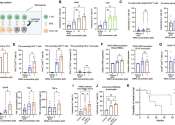New clue into the curious case of our aging immune system
A WEHI study could help solve a long-standing mystery into why a key immune organ in our bodies shrinks and loses its function as we get older. The thymus is an organ essential for good health due to its ability to produce ...
Aug 14, 2024
0
8









